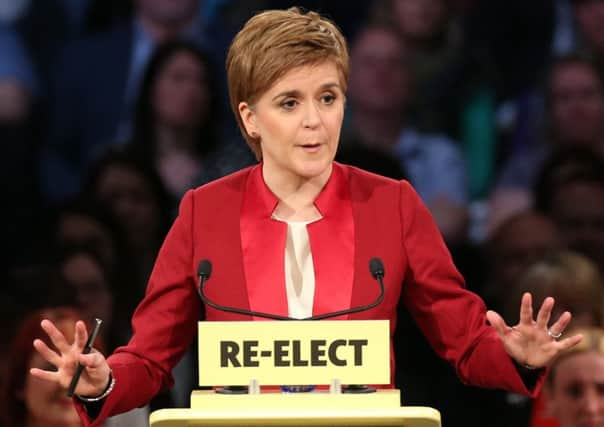Scott Macnab: SNP manifesto is a familiar story


She talked of “deep regret” and acknowledged the challenges facing Scotland’s economy, but insisted her programme for government will focus on the tackling these issues. It was a brief moment, but perhaps shone a light on a tale of two Scotlands which has emerged in the past month or so. On the one hand, we’ve seen a Holyrood election campaign where parties have been almost outbidding themselves to increase taxes and push up public spending by hundreds of millions of pounds. On the other, we have the parlous state of the Scottish economy which has seen soaring unemployment since the start of the year, a raft of factory closures – and even a brief period of downturn in the second half of last year. But, it’s hardly been an issue. Should the economic record of the party in power not be a “central plank of the opposition parties’ political campaigns” during elections, as one letter to The Scotsman last week put it?
When the SNP first came to power in 2007, Alex Salmond declared that one of his flagship policies would be to see Scotland match UK growth levels after years of trailing behind. In fairness this was achieved for lengthy spells under Salmond. But the most recent figures show stuttering Scottish growth of 0.2 per cent – while the UK rate was three times as great at 0.6 per cent.
Advertisement
Hide AdAdvertisement
Hide AdBut has this been reflected in the current election campaign to the new “powerhouse parliament” as Holyrood takes on sweeping new post-referendum controls in the years ahead? Not so far. The campaign has often seen our political leaders adopt an approach of almost belligerent confrontation towards some of the country’s biggest firms. The Liberal Democrat leader Willie Rennie raised eyebrows a fortnight ago when he took part in a protest outside one of the biggest employers in his area, the Amazon distribution centre in Dunfermline. There may be some merit in his concerns about paying the living wage and the firm’s tax arrangements. Rennie did also find himself blocked from a visit to the centre earlier this year, but you wonder if a student-style demo was the best way to deal with a firm which has just unveiled plans to extend its 2,000-strong workforce in Scotland, including the creation of dozens of highly skilled jobs in Edinburgh. And this at a time of sweeping public sector job cuts, which will see Scotland become ever more reliant on private companies for jobs.
Proposals to choke off millions of pounds in taxpayer-funded grants to major, profitable firms like Amazon may also, on the face of it, seem perfectly reasonable. In reality, many companies simply won’t locate here without this incentive and instead go to other parts of the UK or Europe where such assistance is available. A similar Holyrood-wide aversion to fracking in Scotland, despite the absence of hard evidence about any environmental dangers, also makes you wonder about the premium our political leaders place on the much needed jobs which could be created. And try talking to workers at Faslane about the impact of thousands of highly skilled jobs being lost to the community which the new SNP-Labour consensus on axing the Trident nuclear weapons system, which is based there, could bring about. “Economic catastrophe” was how one union leader described it earlier in the election campaign.
The new tax-rasing powers have dominated the campaign. The SNP, Labour and Lib Dems all have their own proposals which would see Scots taxed more than workers south of the Border in a bid to tackle the cuts. Perhaps they at least deserve credit for being bold enough to make use the new powers after the old tartan tax fell into abeyance after successive administrations eschewed its use.
Tax hikes may provide an immediate boost for the public coffers, but most experts agree they are almost certain to undermine growth. The head of Scotland’s Chambers of Commerce, Liz Cameron, took the unusual step last week of warning that higher taxes could chase away talent and damage Scotland’s fragile economy. The long-term impact of this, of course, is less in taxes and lower public spending. So, with no end in sight to the North Sea downturn and the dire problems in manufacturing, where is the great vision to haul Scotland out of this morass?
Nicola Sturgeon is likely to be in sole stewardship of the economy come 6 May with every poll pointing to another SNP majority. Well, a series of flagship proposals were unveiled to boost growth in the SNP manifesto last week. So, among other things: the Government will target support towards the key growth areas like creative industries, financial services, food and drink, tourism and life-sciences; the Small Business bonus will be extended to cut taxes on local employers; a major drive will be undertaken to boost Scottish exports to emerging global markets including China, India and the Middle East.
Sound familiar? They should do – all these measures were in the party’s 2011 manifesto. If this is what we’ve been doing for the past five years, what have we got to look forward to? More stagnation and spiralling unemployment? Ambitious plans which most parties claim for a highly educated workforce are worth little if there’s no jobs for young Scottish graduates to take up. It seems the SNP has escaped the hard questions it perhaps deserved over its economic record during this election campaign. Indeed, if Ms Sturgeon sweeps to the easiest Holyrood election victory since devolution, her opponents may reflect on that now infamous mantra of Bill Clinton’s successful 1992 US presidential campaign: “It’s the economy, stupid.”